This site is supported by our reader . We may realise a commission , at no price to you , if you purchase through links .
Opening the room access to understand your Bichon Frise ’s behavior , you might question if their bark is worse than their bite . While these fluffy companions are know for their gentle nature , they can nip or bite , especially during their playful pup days or when feeling jeopardise .
Your role in nurturing and education is crucial to ensure these moments are momentary and manageable . Dive into the world ofBichon Frises , where science - backed breeding proficiency and a dash of patience can transubstantiate your furred champion into the image of a well - mannered favourite .
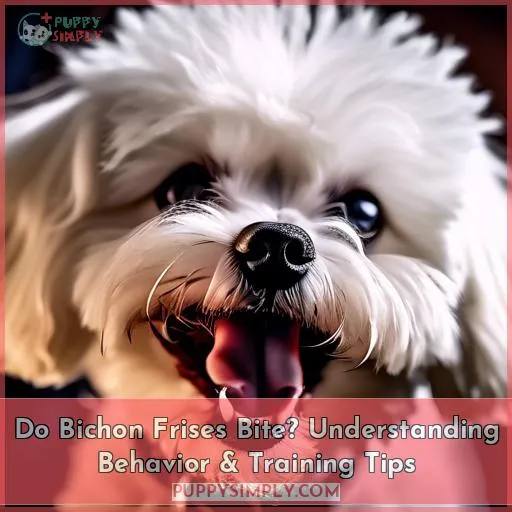
Yes , Bichon Frises can bite , but they typically use biting as a form of communication rather than hostility .
board Of content
Key Takeaways
Understanding Bichon Frise Origins
The Bichon Frise , with its roots in the Mediterranean , has arich account as a companion dog .
Initially favored by sailors for companionship during farseeing voyages , these click later became a symbolisation of luxury among European nobility .
Their elementary purpose has always been to provide comfort and companionship , reflecting in their gentle nature and lower bite force compare to more muscular breed .

Mediterranean Roots
While you ’re learning about the Bichon Frise ’s origins , it ’s essential to translate that their journeying start in the Mediterranean region , where they were ab initio companion dogs for Panama before becoming deary among European aristocracy .
Companion Dogs for Sailors
Historically , Bichon Frises frequently accompanied sailors on their voyages , service as both companions and swop detail . These seafaring pups were more than just maritime companions ; they were inbuilt to the sailors ’ lives , providing comfort and a sentiency of home plate while at sea .
European Nobility Favorites
After becoming privilege comrade for sailors , Bichon Frises further tempt their way into the hearts of European nobility , where you ’ll find they were n’t just pets but hold dear members of majestic households .
To add astuteness and plight your interestingness :
Bichon Frise Bite Force
You might be wondering about the bite force of a Bichon Frise and whether it can really hurt you . While these pocket-sized dogs do n’t have the sinewy jaw of enceinte breeds , their bite forcefulness is still significant enough to cause discomfort , especially if they feel threatened or are in pain .
It ’s important to remember that the Bichon Frise ’s morsel force is comparatively imperfect equate to other breeds , typically falling below 200 PSI , which is a measure of the pressure exerted when a click clamps its jaw .
However , even with their blue nature and blue pungency violence , it ’s essential to train your Bichon Frise decently to foreclose any biting incident .
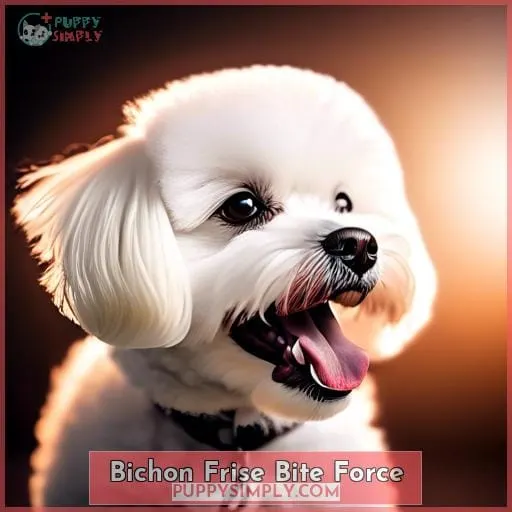
Measuring PSI
In view the bite force out of a Bichon Frise , you ’ll encounter that , despite their modest size and companion - weenie nature , they can exert a certain amount of atmospheric pressure with their bite , typically less than 200 pounds per square inch .
When value PSI , it ’s important to understand thatbite force comparisonamong breeds is influenced by divisor such as size of it and breed - specific traits . Bichon Frises , know for their aristocratical and warm disposition , are n’t spawn for chore take strong bite strength , unlike magnanimous , more muscular breeds .
While the accurate pounds per square inch of a Bichon Frise ’s bite is n’t scientifically immortalize , their chomp force is considered faint compared to other breeds , usually falling below 200 PSI . This lower morsel military unit aligns with their diachronic role as fellow traveller animals rather than Orion or precaution dogs .

However , pain sensing from a morsel can vary among soul and bet on the context of the bite — whether it ’s a playful nybble or a bite out of fear or menace .
To create imagination in the interview ’s mind , consider the following table comparing the Bichon Frise to larger breeds :
Training technique are essential for managing normal puppy behavior , let in biting , and can help prevent the causes of manus mastication . Consistent education , such as redirecting to toys and ignoring the dog-iron when it nips , can teach a Bichon Frise that biting is n’t acceptable behavior .

behavioural propensity like bite and mastication are part of a puppy ’s geographic expedition of the world , but with right guidance and solutions for paw manduction , these can be managed efficaciously .
Comparison With Larger Breeds
While the Bichon Frise ’s insect bite power is weaker compare to larger stock , size is n’t the only factor determining the potential for harm . Bite force , typically quantify in PSI , is just one aspect of a complex equating .
Larger breeds may have a higher PSI due to their powerful material body , but behavioural variance take on a crucial role in the likelihood of a bite hap .
right training proficiency and early socialization benefits can importantly reduce the risk of biting in Bichons , just as they can in large breeds . Size impact on bite force does n’t equate to aggression ; tension , anxiousness , and deficiency of education are more predictive of prick behavior than sizing alone .
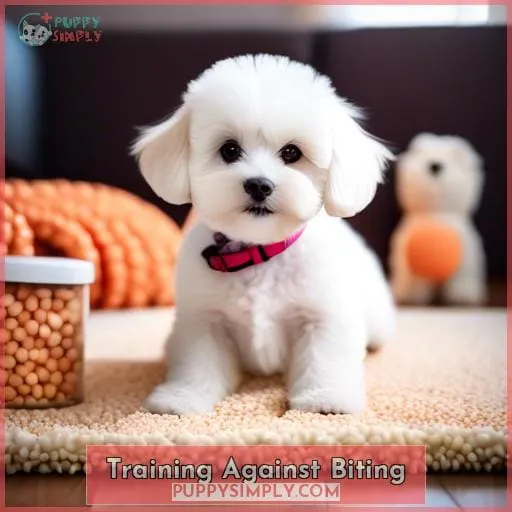
Pain Perception From Bites
When view the pain from a Bichon Frise morsel , it ’s crucial to empathize that the force behind the pungency is n’t the only determinant of pain in the neck .
The context in which the bite pass off and your personal pain threshold significantly influence how painful the bite find .
A playful nybble might be hardly detectable , whereas a sting in a more sensitive or unexpected area , peculiarly if the andiron feels menace , could be more terrible .
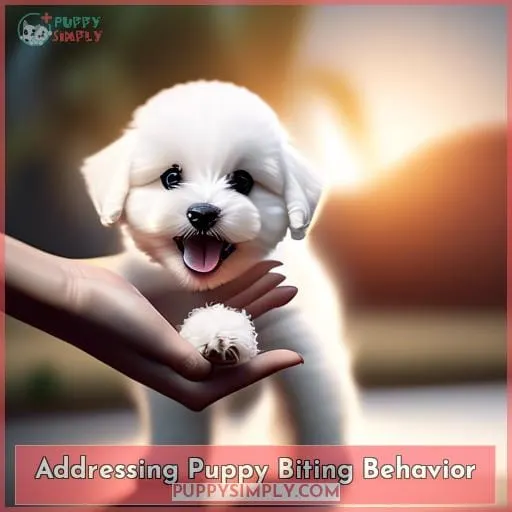
Factors Affecting Pain
You ’ll line up that the pain you feel from a Bichon Frise bite depends on several factors , including the morsel ’s linguistic context and your own sensitivity to ail . The breed ’s broadly gentle nature and affectionate temperament contribute to a milder sting force .
bother perceptual experience from a Bichon Frise snack is influence by single pain thresholds and the purpose behind the morsel , whether it ’s a playful nybble or a reaction to fear or threat .
Factors such as former socialization , reward - establish training , and addressing the dog ’s physical and emotional needs can help oneself minimize biting incidents .
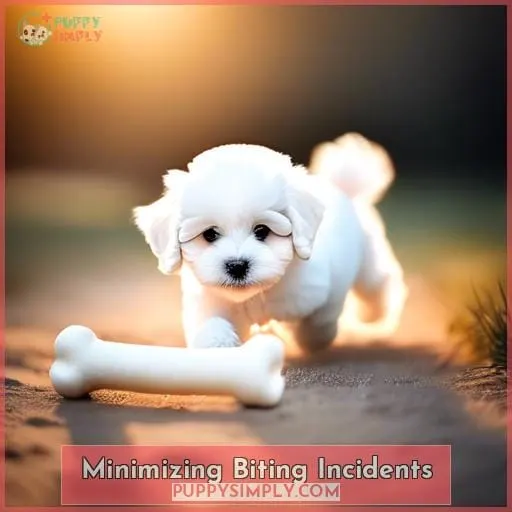
If you experienceexcessive mitt chewing , it ’s essential to identify the root cause , which can browse from temporary soreness to worked up issues , allergies , or boredom . Seeking professional assistance and implement prevention strategy are of the essence in speak and minimizing biting conduct .
Individual Pain Threshold
Your experience of annoyance from a Bichon Frise sting can vary greatly due to your personal pain in the neck threshold . Pain perception is immanent , and item-by-item responses to the same pungency can differ .
Effective training techniques that account for these behavioral patterns are important . Consistency in preparation can help mitigate biting behavior , ensuring safety and understanding between you and your pet .
Bichon Frise Temperament
Bichon Frises are celebrated for their gentle and affectionate nature , making them idealistic companions who flourish on human interaction .
Their behavior is significantly regulate by their fostering , where early socialization and coherent , positive support grooming roleplay crucial use in keep biting tendencies .
It ’s essential to understand that while they are n’t inherently aggressive , a Bichon Frise ’s environment , grooming , and the aid they receive can act upon their demeanour .
Gentle and Affectionate Nature
Bearing in judgment that pain from a snack varies , it ’s of import to notice that Bichon Frises are known for their gentle and tender nature , which typically makes them less prostrate to biting out of hostility .
Effective training method , emphasizing confident reinforcement , can represent behavioral cues and reinforce their docile nature , preventing incidents like a punctured paw pad .
Influence of Upbringing
Training and upbringing encounter a substantial part in shaping a Bichon Frise ’s disposition , as their behavior is act upon by how they ’re raised and trained .
Training Against Biting
When training your Bichon Frise to curb biting doings , it ’s crucial to redirect their natural tendencies towards appropriate outlets . Offering a miniature can provide a positive option to nipping , satisfying their need to manducate while instruct them what ’s satisfactory to morsel .
A business firm , clear command such as no or ouch helps pass that their doings is unwelcome .
Redirecting to Toys
Understanding that a Bichon Frise ’s gentle temperament does n’t forestall the need for bite training , you ’ll get redirecting their natural chewing instincts to toys is an effective method .
This approach fostering Toy Engagement and tender Teething Tips for a happier , well - acquit pup .
Using Firm Commands
Redirecting your Bichon Frise ’s attention to toy is a crucial step in training . However , it is also necessary to use unshakable command to distinctly convey that biting is unacceptable .
Incorporating steady discipline and vocal commands into your preparation regime provides assertive guidance .
This overture , rooted in scientific principles , ensures your Bichon understands and prise boundaries .
Consistency is Key
Always consistently reward your training commands ; it ’s the only elbow room you ’ll see progress in stamp down your Bichon Frise ’s biting habit .
engage consistent methods and prescribed strengthener shapes behavior patterns in effect .
Handling challenges with patience and understanding , these education proficiency foster a sense of rubber and belonging .
Recognizing the complexity of canine behaviour ensures a nuanced coming to every interaction .
Addressing Puppy Biting Behavior
As you receive a Bichon Frise puppy into your household , it ’s crucial to understand that their biting and nipping are part of their normal plurality behavior and not a sign of aggression .
As the possessor , you play a pivotal part in guiding your pup through this learning stage , sic the foundation for healthy interaction .
reproducible breeding , coupled with a deep understanding of your pup ’s demeanour , will help you establish a venerating and loving relationship , ensuring your Bichon Frise matures into a well - mannered companion .
Normal Pack Behavior
You ’ll need to undertake puppy seize with teeth head - on , as it ’s a born part of your Bichon Frise ’s growth and not a star sign of aggression at this point .
Understanding this behaviour through behavioral insightsis crucial .
As an proprietor , your role involve employingtraining technique and socialization tip , emphasise cocksure reinforcement .
This glide path not only nurture a common sense of belonging and safety but also further a deeper understanding between you and your pup .
Role of the Owner in Training
As the leader of your Bichon ’s pack , it ’s your duty to guide them through the biting phase with house , consistent grooming .
Minimizing Biting Incidents
To downplay nipping incidents with your Bichon Frise , it ’s all important to start with early socialisation , expose them to various people , creature , and environment .
This foundation , conflate with wages - based training , can importantly reduce the likelihood of aggressive reactions .
Addressing both their physical and emotional need ascertain they ’re less prostrate to negative behaviors , foster a well - deport companion .
Importance of Early Socialization
Continuity in training is crucial , and other socialization take shape the foundation of a well - deport Bichon Frise , minimizing biting incident and foster trust .
Engaging in puppy classes and playgroups benefits your pet vastly , offering a weapons platform for learning socialization techniques .
Behaviorist insight highlight these experiences askey training milestones , shaping your Bichon ’s interaction and ensuring a harmonious relationship built on understanding and safety .
Reward-Based Training Benefits
Implementing payoff - based training can be highly effective ; when you consistently praise and treat your Bichon Frise for non - biting behavior , you ’re teaching them that gentleness is more rewarding than nipping .
former socializing and consistent breeding can importantly minimise unwanted behavior like sting .
Exposing your Bichon Frise to a variety of masses , animal , and preferences from a young historic period can help concentrate potential aggressive reactions later in life .
Reward - based training using goody and extolment encourages positive doings .
Meeting Physical and Emotional Needs
Addressing your Bichon Frise ’s physical and emotional needs is crucial in minimizing biting incident , building on the substructure of reward - based training .
Incorporating enrichment activity , consistent drill routines , and genial stimulation into their day-to-day life fosters a stiff alliance .
Engaging in bonding activity and playtime strategies not only satisfies their motivation for companionship but also importantly reduces unsuitable behavior like bite .
Frequently Asked Questions (FAQs)
What are the common triggers for a Bichon Frise to start chewing on its paws?
vulgar triggers for a Bichon Frise to masticate on its paws include allergies and skin infections .
Anxiety or tension , and tedium can also direct to this behavior .
How can I tell if my Bichon Frise is biting out of frustration or depression?
To discern if your Bichon Frise is biting due to frustration or low , observe for destructive behaviour or withdrawal , as these can indicate frustration .
While reduced bodily process and increase nap may point imprint .
Are there any specific environmental allergens that commonly affect Bichon Frises and lead to biting or chewing behaviors?
Environmental allergens like pollen , dust tinge , and mold commonly affect Bichon Frises , lead to symptoms such as paw chewing and biting behaviors .
Allergic reaction in Bichon Frises may be because of environmental factors such as pollen , dust mites , mold , or dietary allergens . The symptoms can include itching , sneezing , watery eyes , hide irritations , and gastrointestinal distress .
Bichon Frise owners must be argus-eyed in identifying potential allergic reaction in their pets , as untreated allergies can precede to uncomfortable hide conditions and , in serious cases , result in secondary infections .
To manage allergic reaction in Bichon Frises , it ’s important to confer with a vet to determine the specific allergen causing the military issue . This can involve allergic reaction examination or elimination diets for food - relate allergy .
Once the allergen is key out , steps can be taken to minimize vulnerability and alleviate the symptoms . This might include dietary changes , hypoallergenic shampoos , or medications to control itchiness and fervour .
By address allergies early on and go nearly with a veterinarian , Bichon Frise owner can avail their furry companions lead happier and healthier lives .
What should I do if my Bichon Frise bites while being groomed or during a vet examination?
If your Bichon Frise bites during neaten or vet exams , calmly airt their focus with a preferent toy or goody .
Use incontrovertible reinforcing stimulus to associate these situations with good experience , see to it they ’re comfortable and tension - free .
Can a Bichon Frise develop biting habits if they are left alone for extended periods, and how can this be prevented?
Yes , Bichon Frises can grow biting habit if left alone for lengthy catamenia , as closing off can direct to tenseness , anxiety , and boredom .
To keep this , ensure they have enough mental and physical stimulus , such as toy and puzzles .
Gradually acclimatizing them to being alone , render plenty of employment before leave alone , and possibly getting a associate dog can also facilitate extenuate interval anxiousness and its associated behaviors .
Conclusion
Sailing through the sea of training , you ’ll come up that while Bichon Frises may bite , it ’s a behaviour that can be shaped and rectify .
Your blue counseling , couple with uniform , payoff - based training , will check that piquantness and bites are but a ripple in the weewee .